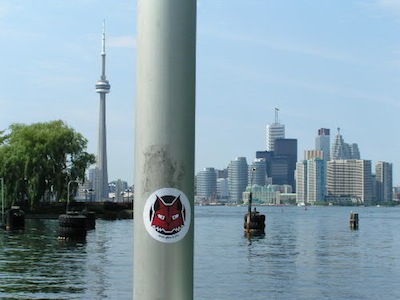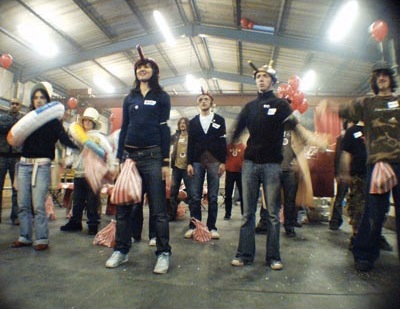Two weeks ago (Thursday, July 1st 2010) I attended Slavoj Žižek’s lecture at the LSE, marking the release of his new book: Living in the End Times. A podcast of the lecture is available to download here.
The ground covered during his two hours of—near continuous—speech will not surprise anyone familiar with his public performance, nor will his habit of interrupting even himself with further points and deviations.
In this post I will address Žižek’s provocative claim that efforts at personal recycling—‘small everyday acts’—equate simply to a superstition. This was by no means the focus of his lecture—it was little more that a passing comment—but, whether he has any valid grounds for making such a statement or not, a careful examination of this contention is an interesting departure point. This statement also attracted a somewhat puzzled question from an audience member (during the minimal time left for questions at the end of the lecture) and additionally has since been picked up on as an unhelpful or confusing argument in Martin Eve’s blog notes on the lecture here. In his answer to the audience member’s question, Žižek associated his position with an anecdote he has told on several occasions concerning Starbucks’ claims of a benefit to poor coffee growing communities being built in to a purchase of their ‘fair trade’ coffee. On this Žižek comments:
In the commodity itself the price of your leftist, honest, resistance to consumerism is included.
In previous lectures (specifically in his RSA lecture of late 2009, available to watch and listen to here) Žižek has also used what I consider to be a clearer example of this point: TOMS Shoes, a US company who, with every purchase made by the consumer, donate a second pair of shoes to a child in poverty in an economically poorly developed country. In these examples Žižek is highlighting a tendency in contemporary consumer capitalism to anticipate the ethical concerns of potential consumers and reverse them, transforming them directly into positive selling points—necessarily at a premium on their less ethical market equivalents with respect to additional costs (such as manufacturing two pairs of shoes), but also potentially as pure ‘added value’, a premium taken solely as profit and paid for by an ethically minded consumer who is happy (or wealthy enough) to pay more for the product’s virtues.
In short, advanced consumer capitalism seeks to recuperate its own negative ethical implications, transforming them into positive commodities that it can sell back to a concerned demographic at a premium.
As a perspective on advanced consumerism, marketing trends and brands, Žižek makes a valid and relevant observation. But, can this be extended—as Žižek appears to be doing—to become a substantive claim about the fundamental nature of advanced capitalism and ‘ethical consumerism’? There are two principle problems with such an extension.
The first is that to make such a claim with certainty, it is necessary to answer both an epistemological and an ontological question in the affirmative. Epistemological—is it possible to make a valid determination about the fundamental ‘nature’ or ‘essence’ of the capitalist system as a whole (and also the nature of ethical consumerism as a subset of this larger system)? Only if such an epistemic determination is possible, can we then reason about its ethical nature—to speak simplistically—is it ‘good’ or ‘bad’? The ontological question—is it even valid to consider such entities as possessing a nature or essence in the first place? Only if the system can be said to possess a nature, can ethical judgments regarding this nature be held to be valid judgments about the system. To put these questions more simply and the other way around: does it possess a nature? and can this nature be known (in order to then pass judgement upon it)?
The second problem is philosophically more simple, but still difficult to resolve in any empirically meaningful way; it concerns a misreading of consumers (or at least of a meaningful proportion of consumers) in their motives for buying ethically branded products, assuming that they do so solely purely out of a desire for pleasure, or if not pleasure directly, then at least to avoid feelings of guilt.
This misreading of consumers motives is most striking in another example Žižek gives during his RSA speech. Referring to a consumer’s choice to buy an organic apple costing significantly more, he claims this choice is rooted in the pleasure gained from a feeling of doing something for the environment. This motivation may, amongst others, exist in a great many consumers and in many it might even be the dominant motivation, but to take for granted that this the true cause—‘look deep into yourself’, Žižek asks—is to take at face value the logic of consumerist marketing; which dictates that the association of a product with representations of virtues or desirable attributes is the only motivating factor in determining a consumers’ consumption decisions. I describe this as the ‘logic of consumerist marketing’ because it equates exactly to the ad man’s dream; which is not that the ‘representation of virtues or desirable attributes is <in reality> the only motivating factor’ but simply that everyone comes to believe that it is (which from the point of view of an advertiser is even better—i.e. more cost effective—as it avoids the expense and difficulties of having to deal with real things at all).
Žižek is incorrect in the totality of his assertion about motivation. Firstly, it seems certain that many consumers actually believe that organic apples are healthier and taste better, and therefore are buying them out of more traditional notions of self interest, rather than an association with a wider ethical good. More significant, it is also perfectly possible that some consumers actually buy organic apples because they do—admittedly in some small way—have less of a negative effect on the environment compared with ones produced using (or overusing) synthetic pesticides and fertilisers. This is not the place for an in depth analysis of the pros and cons of farming methods but, whilst ‘synthetic’ should not be considered a synonym of ‘bad’, it is reasonable to assert the rational value of a ‘precautionary principle’ with respect to public health and the surrounding environment when employing methods that enable dramatic intensification of processes and yields through radical breaks with such processes as they are found in nature. It is therefore clear that some consumers choose to buy organic apples, not because they get a ‘feel good’ pleasure from doing so, but because they believe that organic apples are the preferable option in terms of their personal impact on the wider environment. In these cases I would argue it is neither seeking pleasure nor avoiding guilt that decides the purchase, but rather a rational decision based on certain assumptions about the relative impacts of organic versus non-organic food production on the environment.
This same misreading of motivation can also be seen with respect to Žižek’s analysis of buying fair trade or apparently ‘ethically positive’ products. It is not necessarily experiencing pleasure in the feeling of doing good, nor an attempted avoidance of the guilt caused by participation in the system of capitalist consumption, which prompts the buying of such goods. Rather, it can be considered to be the result of weighing up a situation where—given the necessity for shoes, the lack of skills, tools and time to make them for yourself, and the reliance on the capitalist system of production and trade which results from this situation—the ethically minded consumer simply chooses the option that appears the least bad. The consumer may not necessarily be making the objectively correct decision, but the position from which they are making their decision is one of ‘ethical problem solving’, rather than a position of seeking pleasure or avoiding guilt.
Similarly, when addressing recycling, Žižek contends that at an individual level recycling cannot be anything more than a superstition, since any single practice of recycling cannot make a meaningful contribution to the efforts necessary to prevent ultimate environmental collapse. Again, this is an oversimplification of personal motivations. It is perfectly possible to be motivated, not from a belief that personal recycling will ward off environmental disaster, but from the belief that it makes a smaller contribution to bringing about this inevitable disaster. (However, it should not be forgotten that reduction and reuse—in that order—are both preferable to recycling. Nor should it be forgotten that—unlike recycling—both of these options are antithetical to an expanding economy based on increasing material consumption.) Wholesale transformation of the system might offer the only true possibility of avoiding catastrophe, but since the individual is unable to mobilise the collective agency necessary for such a transformation, they instead simply choose from actions that are possible. In doing so they do not seek to superstitiously ward off environmental disaster, but rather to take what little action is practically available to them as an individual.
To make a fundamental point: the individual nature of consciousness entails that the locus of moral choice (to the extent that such choice exists as a phenomena of consciousness—i.e. presupposing free will) cannot exist at any level other than that of the individual consciousness. From this stems the tendency of both individuals and society to focus on the importance of the actions of the individual, even when such actions have a negligible impact in and of themselves.
If there is in fact any superstition in personal recycling, then it is actually the same superstition that Žižek himself invokes later in the LSE lecture, when he is picked up on in his use of the ‘royal we’. In answer to this he makes reference to the ‘paradox of the performative’—whereby an action is announced as complete in anticipation of its completion—stating that the ‘we’ he refers to is:
…the ghost that comes, not from the past, but from the future of the left.
In the same spirit, when an individual carries out their everyday recycling, it is perfectly possible to think of this as an act of identification with an expansive future community who act similarly (and on such a mass scale, such recycling efforts would make a difference).
To be fair to Žižek, when he makes these claims regarding ethical consumerism and recycling, he may simply be seeking to highlight the danger that fetishising such activities has the potential to displace real action for a fundamental change in the system. However, he is neither explicit enough in stating this, nor is he able to offer a concrete suggestion of what action individuals should be taking instead.
Žižek has a background in Lacanian psychoanalysis and Hegelian philosophy, two subjects about which I currently have very limited knowledge. I suspect that within Hegelian philosophy he may have found some reason to suppose that he can answer the epistemological and ontological questions I raised earlier; and that, from a perspective of psychoanalysis, he may feel able to justify claims about pleasure as a fundamental motive in decision making, or contend that many decisions are made at an unconscious level and are therefore not subject to rationality or conscious ‘will’. (In fact, on my shelf in front of me as I write this I have his 1992 book, ‘For They Know Not What They Do: Enjoyment as a Political Factor’, which I have not yet read, but I anticipate may address these issues.)
Though he didn’t mention it in this LSE lecture, I am interested in Žižek’s previous references to the revolutionary potential of an ‘materialist theology’. However, in his consideration of the guilt of consumerism—and in using phrases such as, ‘buy your redemption’—Žižek is at times very close to reactivating the Christian notion of sin, with capitalism taking the place of the Devil as a transcendent evil. Again, making such a claim—which appears to depend on establishing the underlying essence of a system—requires answering the ontological and epistemological questions raised earlier. Unless these can be answered it cannot be said that capitalism is evil in essence, nor consumerism sinful, but rather that their evil exists in their negative effects (as much as these can be separated out and attributed to capitalism, as opposed to other human failings).
If it were possible to negate these effects then such a negation would not simply buy off guilt; it would eliminate any need to feel guilty in the first place. ‘Capitalism with a human face’ (as Žižek mentions as seemingly the limits of contemporary left’s imagination) would genuinely be a solution in itself.
This is not to say that such an elimination of negative effects is possible within capitalism. Nor does it prove that radical transformation of the system is not the only way to achieve such an end. It is simply a reminder that whatever remedy may be posed, it will be successful only to the extent that enacting it removes these negative effects (without creating new ones to replace them), rather than through the overthrow of the phantom essence of a system. If radical transformation of the capitalist system is necessary, such a transformation must be immanent—negating the specific evils of the capitalist system in the new system (capitalist or otherwise) that is born from the transformation.
Measured against capitalism defined as a transcendent evil, all individual acts appear superstitious.






